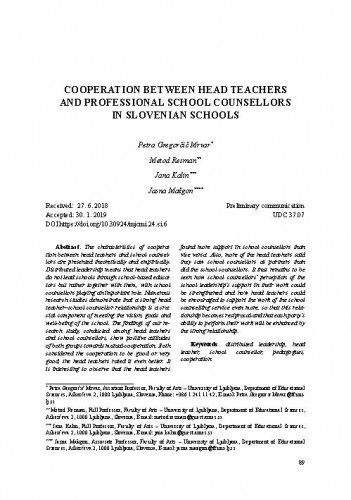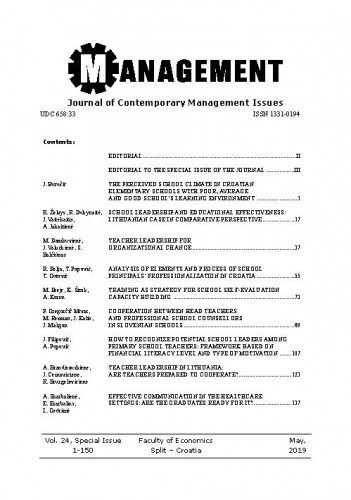The characteristics of cooperation between head teachers and school counsellors are presented theoretically and empirically. Distributed leadership means that head teachers do not lead schools through school-based educators but rather together with them, with school counsellors playing an important role. Numerous research studies demonstrate that a strong head teacher–school counsellor relationship is a crucial component of meeting the vision, goals and well-being of the school. The findings of our research study, conducted among head teachers and school counsellors, show positive attitudes of both groups towards mutual cooperation. Both considered the cooperation to be good or very good, the head teachers rated it even better. It is interesting to observe that the head teachers found more support in school counsellors than vice versa. Also, more of the head teachers said they saw school counsellors as partners than did the school counsellors. It thus remains to be seen how school counsellors’ perception of the school leadership’s support in their work could be strengthened and how head teachers could be encouraged to support the work of the school counselling service even more, so that this relationship becomes reciprocal and that each party’s ability to perform their work will be enhanced by the strong relationship.; U ovom se radu teorijski i empirijski predstavljaju obilježja suradnje između ravnatelja i školskih pedagoga. Distribuirano liderstvo podrazumijeva da ravnatelji ne vode škole pomoću školskog osoblja, već zajedno s njima, pri čemu školski pedagozi imaju važnu ulogu. Različite istraživačke studije ukazuju da je odnos između ravnatelja i školskog pedagoga ključan za ostvarivanje vizije, ciljeva i dobrobiti u školi. Rezultati ovog istraživanja, provedenog među ravnateljima i pedagozima, pokazuju da obje skupine imaju pozitivne stavove prema međusobnoj suradnji. Obje skupine, također, smatraju da je postojeća suradnja dobra ili vrlo dobra, a ravnatelji je ocjenjuju kao još bolju. Zanimljivo je spomenuti da su ravnatelji imali veću podršku od strane pedagoga, negoli je to moguće primijetiti u obrnutom slučaju. Također treba napomenuti da je veći udjel ravnatelja vidio partnere u školskim pedagozima, negoli se isto može reći i za suprotan slučaj. Stoga ostaje otvorenim pitanjem kako školski pedagozi percipiraju ravnateljsku podršku svom poslu te kako bi ih se ravnatelje moglo ohrabriti na veću podršku pedagozima, kako bi se navedeni odnos mogao razvijati u recipročnom smislu te međusobno podupirati obavljanje obaju poslova.
Sažetak

 Management : journal of contemporary management issues : 24, Special Issue (2019) / editor-in-chief Nikša Alfirević.
Management : journal of contemporary management issues : 24, Special Issue (2019) / editor-in-chief Nikša Alfirević.